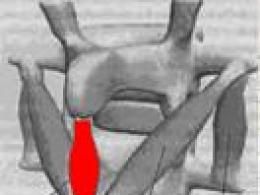Protein intake per 1 kg of body weight. So how much protein should you eat per day? Where to get so much protein
In order for the process of losing weight to be as effective as possible, you need to plan everything correctly. You must have correct menu With the right ratio proteins, fats and carbohydrates + physical activity (well planned workout). In this article, I will tell you How many grams of protein do you need per day to lose weight? How to calculate everything correctly, and I will give an example of the best sources of protein foods.

Protein is one of the vital components for our body. If you do not consume enough protein, it will negatively affect the health of the whole body. (problems with skin, hair, immunity, hormonal background etc.).
Also, this element is very important in the process of losing weight and drying the body. By the way, during drying it is much more important than when normal weight loss, because it is protein food in combination with strength training allows you to save muscle mass. During weight loss, proteins need to be consumed less, and on drying - more.
If the goal is then you need to consume 1.2 - 1.5g of protein per 1kg of body weight if you are a woman (for example, if your body weight = 70kg, then you need to do this: 1.5 * 70 = 105g) and 1.7 - 2g of protein per 1kg of body weight if you are a man (for example, if your body weight = 90kg, then you need to do this: 2 * 90 = 180g). When calculating, it is very important to take into account your initial percentage. subcutaneous fat. For example, if you are a woman and your height is 150 cm and your weight is 90 kg, then most likely your protein norm is 1.2 g per 1 kg of body weight (maybe even 1g per 1kg). And if, with this growth, your weight is 70 kg, then you need to multiply 1.4 - 1.5 g per 1 kg of body weight. That is, the more excess fat, the smaller the number to be multiplied by (same goes for men).
If the goal is cutting, then you need to consume 1.5 - 1.8g of protein per 1kg of body weight if you are a woman and 2 - 2.3g of protein per 1kg of body weight if you are a man. In some cases, women can increase their protein intake to 2 grams per 1 kg of body weight, and men to 2.5 g per 1 kg of body weight. Do not need anymore. And then, to such norms it is necessary to raise only if the muscle mass begins to collapse. If everything is ok (muscles are normal, but only fat burns), then you do not need to increase the protein.
How many grams of protein do you need per day to lose weight, you already understood. Now I want to talk about such a myth as: "At one meal, the body is able to absorb no more than 30g of protein." Have you heard this? So, I’ll tell you right away that this is nonsense!
Each organism is individual, so it is foolish to say that everyone has the same rate of assimilation of protein foods. For some, the body really cannot absorb more than 30g of protein at a time, but there are those who can easily absorb up to 70g of proteins at a time. Also, if you eat more than 30g, this does not mean that only 30g will be digested, and the rest will go down the toilet. Your body can probably absorb all 70g, it just takes longer to do so. (food takes longer to digest).
Only experimentally can you find out how much protein your body absorbs at a time. Start eating small protein meals. Break down your entire daily protein intake to get about 20g per serving. Gradually increase servings to 30, 40, 50g of protein. If you increase the portion and at the same time there are no problems with the gastrointestinal tract + progress does not slow down, then your body calmly assimilates large portions protein food.
Finally, I want to provide you with a list of the best protein foods:
- chicken eggs (they are the best source of protein)
- turkey and chicken meat
- meat (beef, lamb, rabbit, pork, etc.)
- cottage cheese (I recommend choosing one that has a minimum% fat content, since it is in such cottage cheese that there are most proteins)
- fish (low-calorie protein sources that most often make up protein base diet during weight loss
- seafood (shrimps, crabs, squids, etc.)
"Absolutely ridiculous!" - that's what I think when reading popular books on nutrition for women. It was terrible. Yogurt, dry breakfast, coffee and a glass of juice for breakfast. Where is the protein? Of course, yogurt contains a little, but not enough to maintain the energy, satiety and nutrition that an active woman needs. It's time to be clear. You need to take this old school, fairy tales about diets and throw them away! Just like burning old bras from the 60's, let's burn old diet books, and let's go through the program - A woman needs protein!
Jen Hendershott, two-time Mrs. Olympia, International Fitness Champion, says we need protein for muscle maintenance, energy, and even increased loss. excess weight.
Unfortunately, protein is a nutritional element that is often underestimated when it comes to women's diet. In a sense, many people believe that women do not need to be given special meaning protein in their diet, but it is necessary.
Protein is made up of amino acids, the building blocks of many tissues in our body, including muscles. Some amino acids are non-essential, which means that the body cannot produce them, so they must be obtained from food.
When you exercise, you destroy muscle tissue. In order to repair that muscle tissue, build muscle and become stronger, you need to give your body protein to replace the amino acids it needs to repair itself. If you don't get enough protein in your diet, your body doesn't have enough amino acids, especially the important amino acids, to correct operation and post-workout recovery.
Where can you get these missing amino acids from?
That's right, from muscle tissue! All hard work will be in vain! Also, in addition to the need for protein for post-workout recovery, protein and amino acids are important for many other reasons:
- Maintaining the Functioning of the Immune System
- Health maintenance connective tissue, hair, nails and other tissues
- Maintaining Energy Levels
Now we know why protein is so important, let's determine how much protein a woman needs.
How much protein per day does a woman need?
 The recommended daily protein intake for a sedentary adult is 0.8 grams per kilogram of body weight (0.8 g/kg). It should be noted that the recommended protein level applies to both men and women. But what about active women, they need more protein than sedentary? The answer is unequivocal - YES, but not by much. How much protein does a girl need for muscle growth? - A sufficient amount of protein intake per day is about 1.5 gr. per kilogram of body weight.
The recommended daily protein intake for a sedentary adult is 0.8 grams per kilogram of body weight (0.8 g/kg). It should be noted that the recommended protein level applies to both men and women. But what about active women, they need more protein than sedentary? The answer is unequivocal - YES, but not by much. How much protein does a girl need for muscle growth? - A sufficient amount of protein intake per day is about 1.5 gr. per kilogram of body weight.
Protein Facts
International Society sports nutrition recently voiced her opinion on protein intake:
- Extensive research has supported the notion that people who exercise regularly require more protein than people who exercise. sedentary image life.
- Absorption 1.4-2.0 g/kg/day of protein for exercise active person not only safe, but also can improve exercise adaptation.
- Active healthy people, with the inclusion of this amount of protein in a balanced, nutrient-rich diet, kidney function and bone metabolism are not impaired.
- While it is possible for a physically active person to get their daily protein intake from a varied, regular diet, protein supplementation in various forms is a practical way to get the right and quality protein for athletes.
- Different types and quality of protein can affect biological value amino acids following protein supplements. The superiority of one protein type over another in terms of recovery optimization and/or training adaptation remains to be convincingly demonstrated.
- Timely intake of protein important component general program training, especially for proper recovery, immune function, growth and maintenance of body weight.
- Under certain circumstances, special additives amino acids, such as branched-chain amino acids (BCAAs), can improve exercise performance and post-exercise recovery.
From this we can see that active women benefit from consuming 2g/kg bw of body weight. For a woman weighing 68 kg, this means that she needs 136 grams of protein per day. Ideally, your protein should be divided throughout the day. If you eat five times a day, you need to consume 30 grams for each meal (example below).
An example of a diet containing a norm of protein per meal
 Let's substitute this number for an example of a diet. Only protein will be listed, excluding carbohydrates and fats, because they are very dependent on your diet and goal.
Let's substitute this number for an example of a diet. Only protein will be listed, excluding carbohydrates and fats, because they are very dependent on your diet and goal.
- Meal 1: A cup of egg whites
- Meal 2: 1.5 scoops of protein powder
- Meal 3: 113 grams of chicken
- Meal 4 (post-workout): 1.5 scoops whey protein
- Meal 1: 113 grams of fish (tilapia or salmon)
***Each amount of protein shown corresponds to 30 grams of protein.
Foods are good sources of protein
- Eggs and egg whites
- Chicken
- Turkey
- lean beef
- Fish (tuna, tilapia, salmon, mahi-mahi, halibut)
- Protein Powder
There's no reason you can't meet your daily protein needs! With a quality, low-carb, fat-free powder, it's easy to make a quick smoothie and satisfy your sweet cravings at the same time. Dietary protein is very important in a woman's diet. Women need the same amount of protein as men (depending on body weight). Recommended use active women about 1 gram of protein per pound of body weight.
If you want to develop in gym and achieve the body of your dreams, eat protein and don't let anyone tell you that women don't need protein!
Proteins (proteins) are the main material for the development of all cells and tissues of the body. Without them, life would be impossible. They are involved in the formation of hormones and enzymes, in protecting the body from infections, and promote the absorption of fats, carbohydrates, vitamins and minerals from food. The lack of protein in the body, as well as its excess, leads to extremely negative health consequences. Therefore, it is important to know how much protein a person needs for normal life.
Functions of protein in the human body
Protein for your body
Proteins are made up of amino acids, which are healthy and full life human core value. Not all amino acids are equally useful - out of 20 amino acids involved in the formation of proteins, 12 are synthesized in the body, but 8 are indispensable and can only come from food. Daily rate protein intake provides the body with the necessary amount of amino acids to perform the most important functions for life.
- regulation of metabolism.
- Maintaining in good condition hair, nails, skin, bones, blood vessels.
- Breakdown and absorption of food.
- Growth and development of muscles, control over their work.
- Protection against bacteria and viruses - the production of antibodies.
- Delivery of oxygen from the lungs to other organs of the body.
Therefore, the human body is able to work normally only in the presence of enough squirrel. They do not accumulate "in reserve" like fats or carbohydrates, so they must be supplied daily with food. Its deficiency immediately affects health. But you should know that a significant excess of the daily intake of protein inevitably leads to diseases of the liver and kidneys, gout, causes inhibition of the intestinal microflora.
Signs of protein deficiency in the body

Definition Table required amount squirrel
Insufficient protein intake can occur due to different reasons(unbalanced diet, diseases digestive system, oncology or extensive burns), but the symptoms of protein deficiency are always the same:
- constant fatigue and apathy;
- frequent stool disorders;
- dryness and pallor of the skin;
- decreased immunity;
- cessation of menstruation in women and problems with potency in men;
- hair loss and brittle nails;
- the appearance of excess weight or vice versa a sharp decline(with anorexia).
Emerging health problems (unless, of course, they are associated with oncology or severe chronic diseases) can be easily solved by adding to your diet protein food. Therefore, it is necessary to know how much protein per day the human body needs in order for all its organs and systems to function normally.
How much protein should a person get per day
The daily protein requirement for each person is individual and depends on:
- age;
- gender;
- physique and muscle mass;
- lifestyle and activity level.
That is why it is impossible to say unequivocally how much protein a person needs to consume per day. miniature elderly woman it will require much less protein than the same amount that a muscular guy who works out at the gym five days a week should consume daily.
The Public Health Association has determined that the daily protein requirement for the average person is 90 grams.
According to the recommendations World Organization health care daily protein requirement for humans is 0.75 g per kilogram of body weight. But this is rather minimal. allowable level protein intake, which assumes its complete digestibility from food.
In reality, up to 15% of the incoming protein is not absorbed, so nutritionists recommend increasing this value to 0.9-1 g / kg of body weight. It should be borne in mind that for pregnant and lactating women this figure is increased to 1.5 g / kg, and for people involved in heavy physical labor and athletes - up to 2 g per kilogram of body weight.
Thus, the daily protein intake for middle-aged people with normal weight is:
- for women leading sedentary image life - 65–80g;
- for athletes - 120-150g;
- for pregnant and lactating women - 100-130 g;
- for men doing light work office workers) - 75–100 g;
- for men engaged in heavy physical labor (loaders, miners) - 130–160 g;
- for athletes - 180–220g.
The female body absorbs protein worse, processes its excess into urea much more slowly, therefore the daily norm in them in women is lower than the male norm.
Often people involved in bodybuilding seek to further increase the amount of protein consumed in order to gain muscle mass. The same situation arises for those who want to lose weight on a protein diet. The daily protein intake increases to 3 g/kg of body weight and above, and this is already fraught with serious health consequences. By purchasing beautiful body, you can easily get problems with digestion in best case and kidney failure at worst.
What foods are high in protein
To correctly form your diet in accordance with the daily intake nutrients, including protein, you need to know how many grams of protein are contained in certain products. Proteins are found in animal products and plant origin. But the fact is that in animal proteins there is full set amino acids, but in plant products, some amino acids are absent.

Proteins, fats, carbohydrates and their ratio in a complete diet
What do you need to eat every day to get necessary for the body protein per day? Below is a list of protein champion foods (per 100g).
- Soy - 35 g;
- Chicken breast - 29 g;
- Lean beef - 27 g;
- Salmon - 25 g;
- Legumes (lentils, beans) - 21–24 g;
- Cheese - 22–25 g;
- Nuts - 15–25 g;
- Eggs - 17 g;
- Cottage cheese - 14–18 g;
- Cereals - 10–12 g.
Proteins coming from plant foods are called defective. But these products do not contain cholesterol and saturated fat and they are rich dietary fiber. If you use a variety of herbal protein products, you can provide the body with all the necessary amino acids.
Animal proteins are complete and much better absorbed by the body and help to digest vegetable proteins. Nutritionists advise that they make up 60% of the daily intake of proteins, and vegetable - 40%.
When compiling a diet, one should pay attention to the fact that no more than 40 g of protein can be absorbed at one meal. Therefore, in order to obtain the necessary daily norm, it is necessary to divide it into two or three doses. Undigested protein will cause putrefactive processes in the intestines and can lead to diseases of the gastrointestinal tract.

The ratio of proteins, fats and carbohydrates
How to calculate the daily rate of proteins for weight loss
When compiling a daily diet, it is necessary to take into account the calorie content of protein products. It is impossible to eat nuts or cheese as the main source of protein when losing weight. These foods are quite high in calories. high content they have fat. Most nutritionists, when asked how much protein a person should consume per day when losing weight, recommend increasing their daily intake to 2 g / kg, since protein foods:
- saturates the body for a long time healthy calories, and their excess is never deposited in the subcutaneous fat;
- helps to digest fatty and carbohydrate foods faster;
- promotes an increase in lean body mass, and muscles are a factory for burning calories and destroying excess fat.
When losing weight, proteins should account for at least 30% of daily allowance calories. For a short time (no more than 3 days), this rate can be increased even up to 40-50%. At the same time, it is very important to comply drinking regimen and drink at least 2 liters of water per day. Thus, with a daily calorie intake of a losing weight person of 1200 kcal, the proportion of proteins is 350–500 kcal. Fats and carbohydrates will account for the rest of the calories (700–850 kcal).
How to get your daily protein intake
The optimal ratio is considered to be a combination of animal and vegetable proteins in a dish, and as a snack between meals, you can use a handful of nuts or a couple of slices of cheese. The daily protein requirement for a person of average weight leading a sedentary lifestyle is contained in:
- 200 g boiled chicken breast;
- 250 g of salmon family fish;
- 250 g boiled beans;
- 300 g of hard cheese;
- 500 g of cottage cheese with a fat content of 5%.
When losing weight and gaining muscle mass, it is recommended to double the consumption of these products. In order not to overdo it with the protein content, but to maintain a balance of nutrients and vitamins, you need to eat small portions of these products, but often by combining them with each other, and be sure to add fruits, vegetables and herbs to the menu. In no case should you eat only protein foods, completely excluding fats and carbohydrates. Otherwise, the metabolism will inevitably be disturbed, which will lead to poisoning of the body and various diseases. Proteins are an essential part healthy eating Therefore, their deficiency or excess threatens with great health troubles. That is why it is so important for every person to know the daily protein intake necessary to maintain health in order to make a balanced daily diet.
Friends, today we will please you with the next issue of theoretical material about bodybuilding. Namely, we will analyze how much protein should be consumed per day for maximum effective growth muscle mass. So let's go.
What is protein?
Protein (from English - protein) is an organic substance that consists of a set of amino acids. Amino acids are organic matter consisting mainly of acids. There are several hundred of them, but only a couple of dozen are actively used to build the cells of all life on planet earth. Other types of amino acids are very rare and only in certain organisms.
It should be noted here that all protein structures made up of the same amino acids, but the difference is that the order and quantity of each amino acid in a cell is different. This is also called the amino acid profile.
For example, in humans, protein structures for a whole third (30-35%) consist of only 3 amino acids - leucine, isoleucine and valine. They are also called irreplaceable. amino acids BCAA (branched chain amino acids - amino acids with branched side chains), because the body cannot synthesize them on its own from other amino acids.
It was introductory part. Now let's move on to the recommendations for the amount of protein per day.
Is high protein intake justified?
I think many have heard the standard figures in the region of 2 grams of protein per 1 kilogram of body weight, and some sources even indicate 3 or all 4 grams per kg of weight. But really high doses of protein are simply not needed in natural bodybuilding (on our website, the main recommendations are aimed specifically at natural training). Moreover, at high doses (from 3g or more), the protein has a toxic effect on the body, especially on the kidneys.
If people using anabolic steroid, may in some periods with intensive weight gain use increased amount squirrel, and it will be fully justified. Then in natural training it doesn't make sense, because athletes simply do not have sharp jumps in mass gain and cannot be at all. A natural athlete gains mass steadily slowly, without sharp fluctuations. So here Need food stability.
Well, we figured out the fact that you do not need to consume an increased amount of protein. But is it possible to give specific recommendations on the quantity? Yes, it is quite possible!
Let's try to calculate how much protein we need for muscle growth. Of course, I do not claim to scientific rationale their calculations, and this should not be taken as the ultimate truth, but quite interesting conclusions can be drawn.
So, it has been scientifically studied that for normal functioning human body per day you need to consume 0.7-0.9g of protein for every kilogram of weight. Let's take it for starting point. Now we need to add to this the amount that is still required for the growth of our muscles. Let's try to calculate it.
The body of an adult is approximately 70-75% water. True, it should be noted here that with age, the amount of water decreases. At birth, a person has more than 80% water, and in old age it reaches 60%.
Human muscles are about 80% water. Therefore, to build 1kg of muscle, we need about 200g of protein, but with a very good amino acid profile. Because number of three main essential amino acids in food is clearly not the same as in the human body (you won't find protein animal food, which consists of a third of essential amino acids). Therefore, the amount of protein can be increased - up to 300g.
Plus, it must be added that the digestibility of protein in people is different - someone is better, and someone is worse. Let's take an average of 75-85%, and the amount of protein for 1 kg of muscle growth increases to about 350gr.
Now let's think, in how many days can a natural athlete add 1kg of pure muscle? Here it is simply impossible to give even an approximate answer ... But you can argue like this - what is the most famous (to me or someone else) How many muscles did a person gain, say, in a month? Personally, I know people who managed to gain 5-6 kg per month. Of these, there were probably 4 kilograms of pure muscle.
BUT this is either after a long rest and detraining, or for beginners who have just come to the gym, whose body has not yet adapted to the load. Natural athletes who have been doing the right thing for a year or more will most likely not have such gains in mass (more precisely, muscles). At least, I have not met such people.
Okay, we'll even take the highest possible (I would even say unrealistic) results in 4kg of pure muscle per month. And in addition, we get just the same calculated 350g of protein per week for 1kg of muscle. We divide by 7 days and we get 50g per day.
That is, if a person weighs 80kg and for basic life support, he needs to eat about 70g of protein per day, then you need to add to this diet 50gr, and it turns out 120gr protein per day.
And this is just 1.5g per kilogram weight! And this is on condition that he will gain weight at a crazy pace and taking into account the poor amino acid profile of the food and the incomplete digestibility of protein !! That is, even at the same time, 2 grams is not even close!
Therefore, eating more than 2 grams of protein is simply unwise. (you will essentially be translating products), firstly. And secondly, you create unnecessary increased load on the body.
Thus, we can conclude the following: for natural athlete more than enough to use 1.5-1.7gr protein for every kilogram of your weight, and this is still with a fairly large margin.
By the way, here interesting video on this topic, we advise you to look at:
This article comes to an end. And now you know exactly what protein is, what it is for and how much it needs to be consumed per day for effective muscle growth!
P.S. if you have any questions or just want to ask us something, please ask questions in the comments, or you can use the form feedback- To do this, go to the "Contacts" section.
Your personal trainer online
Important! If you are determined to achieve results and want to as soon as possible achieve the goal (lose weight / dry the body, gain muscle mass or just lead healthy lifestyle life and have athletic build, correctly compiling a diet / nutrition plan, training program and daily routine), then use the services personal fitness online coach ==>
Unfortunately, due to a lack of understanding of the issue and unwillingness, most people do not make any effort to proper development his daily ration. Many can instantly answer the question about the cost of a particular product, although this indicator is constantly changing, but few people are just as well aware of the value and calorie content of food consumed. It is highly desirable to know this, but it is also necessary to know how much protein, carbohydrates, fats and calories a particular person should consume per day.
The opinion of nutritionists is that the average daily rate should be 2500 kcal, which means that the body receives the amount of energy and nutrients necessary for normal activities, without significant physical overload. People who are constantly engaged in heavy physical labor should consume large quantity calories and nutrients, otherwise an energy deficit is inevitable and building material, loss of mass and volume, endurance and strength.
Protein intake per day
For protein, the recommended norm is 100 grams per day , it can give the body four hundred and ten kilocalories. A decrease in this level is fraught with further muscular dystrophy, and it all starts with the weakness of muscle tissue. Exceeding the protein norm without adding physical activity usually leads to an increase in the level of homocysteine in the blood.
By adhering to a similar caloric content of the daily diet, you can successfully deal with overweight. However, what has already been accumulated should be eliminated by reducing daily calories nutrition.
The minimum amount of protein that can be consumed per day to maintain strength indicators should correspond to 1.6 - 1.7 grams per kilogram of weight, and for endurance this indicator should not be less than 1.2 - 1.4 grams per kilogram of weight per day.
With less, they may appear Negative consequences for the body, but a violation of nitrogen balance and metabolic disorders.
Scientists say that a third of the body's energy should come from protein. If one gram of protein contains four kilocalories, then in the accepted average diet in three thousand kilocalories per day, a thousand are obtained from protein sources. To obtain these figures, people weighing sixty kilograms were studied, so for a person of this weight, with a diet of 3000 kcal, you need about a quarter kilogram of protein, this will correspond to four grams of protein per kilogram of body weight per day.
Protein in food
For example, for a set of such a number of ordinary food, which has not been frozen or otherwise processed, you need about one cup of grated cheese containing 28 g of protein, a hundred gram can of tuna (22 g), three glasses of milk (24 g), a quarter kilogram of lean beef (66 g), a cup of beans (13 g), quarter cup peanut butter(32 g), chicken breast(27 grams), three egg whites(12 g). In this case, 224 grams of protein will be typed, about what you need.
Many factors affect the normal absorption of food, so it is additionally recommended to use protein blends to complement to the right amount your diet. Although, we should not forget that people, at least men, usually weigh clearly more than sixty kilograms, and one should be more careful when determining the size of energy costs.






